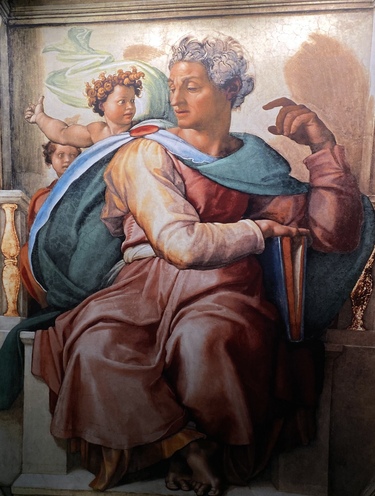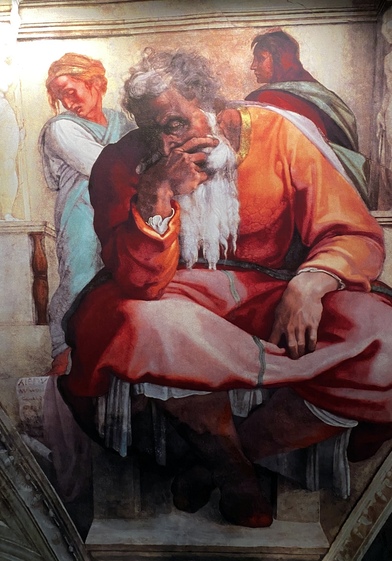
Michelangelo: Sistine Chapel Ceiling
Content created: 2018-07-10
File last modified:
Previous file First file

[Isaiah 37: 21] Then Isaiah, the son of Amoz, sent to Hezekiah, saying, “The Lord God of Israel says, ‘Because you have prayed to me against Sennacherib king of Assyria, [22] this is the word which The Lord has spoken concerning him. …:”
[28] I know your sitting down, your going out, your coming in, and your raging against me. [29] Because of your raging against me, and because your arrogance has come up into my ears, therefore I will put my hook in your nose and my bridle in your lips, and I will turn you back by the way by which you came.
…
[33] “Therefore The Lord says concerning the king of Assyria:”
‘He will not come to this city, nor shoot an arrow there, neither will he come before it with shield, nor cast up a mound against it. [34] He will return the way that he came, and he won’t come to this city,’ says the Lord. [35] ‘For I will defend this city to save it, for my own sake, and for my servant David’s sake.’ ”
[36] Then the Angel of the Lord went out and struck one hundred and eighty-five thousand men in the camp of the Assyrians. When morning dawned, behold, these were all dead bodies. [37] So Sennacherib king of Assyria broke camp and went away, returned to Nineveh, and stayed there. [38] As he was worshiping in the house of Nisroch his god, Adrammelech and Sharezer his sons murdered him with swords and escaped into the land of Ararat. His son Esarhaddon reigned in his place.

[Jeremiah 49:34] The Lord’s word came to Jeremiah the prophet concerning Elam, in the beginning of the reign of Zedekiah king of Judah, saying, [35] “Thus says the Lord of Hosts:”
Behold, I will break the bow of Elam, the chief weapon of their might. [36] I will bring against Elam the four winds from the four quarters of the sky, and will scatter them before those winds. There shall be no nation where the exiles from Elam shall not come.
[37] I will break Elam before their foes, and before those who seek their destruction. I will bring disaster on them, venting my fierce anger, and I will send the sword after them, until I have destroyed them.
[38] I will set my throne in Elam, and from there I will destroy king and princes. This is the word of The Lord. [39] ‘But it will happen in days to come that I will reverse the fate of Elam; thus says the Lord.
Return to top.
Previous file First file
Review quizzes are available for Extracts 1 and 2.
Questions arranged in two "wimp" versions:
1,
2
The same questions arranged in one "normal" version:
1
Background Design: Hebrew Lines From the Book of Jonah